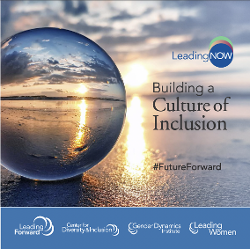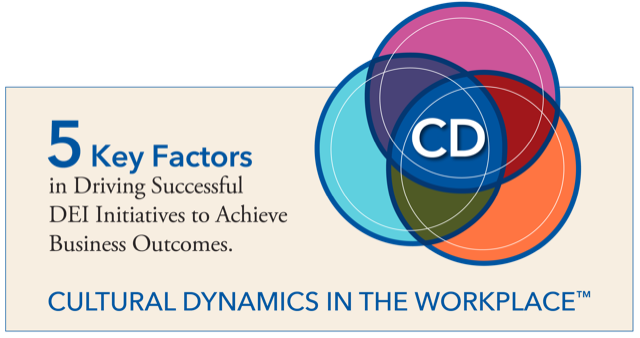
-
For DEI Success, Do This, Not That In 2023
-
DO THIS, NOT THAT - How Reverse Mentoring Leads to DEI Success
-
DO THIS, NOT THAT - How Investing In Leadership Development Leads To An Inclusive Culture
-
Are You Holding Yourself And Your Team Accountable In The Right Way?
-
Leading NOW Supports Organizations That Develop Women Leaders: A Tale Of Three Partnerships
-
Our Best-in-Class Workshop Topics Bring Exceptional Learning Opportunities to Industry Events
-
DO THIS, NOT THAT - How Leaders Can Create a Psychologically Safe Workplace
-
Leaders Need Training Too!
-
Top 3 Things About Talent That It's Time For CEOs To Address
-
Why the Most Successful Leaders Create a Psychologically Safe Workplace
For DEI Success, Do This, Not That In 2023
In a recent Forbes article, Leading NOW’s CEO, Kelly Primus, addressed the DEI Churn & Burn many organizations are experiencing in their quest to create a more inclusive culture. In the article, Kelly talks about some of the things organizations can do to stop the constant turnover of Chief Diversity Officers who are in the trenches, trying to transform the company’s culture.
This got us thinking, and begs the question – Is your DEI strategy passive or POWERFUL?
For 2023, we’re kicking off the new year with a monthly blog series titled, DO THIS, NOT THAT. Each month we’ll address common actions that most DEI strategies include (passive), the barriers to inclusion identified by our own research over the last 20 years, and the what, why, and how, to make your DEI strategy more powerful.
Let’s start with the most important DEI barrier of all…
DO THIS, NOT THAT - How Reverse Mentoring Leads to DEI Success
Is your organization doing enough to help underrepresented talent succeed? Probably not.
While most DEI initiatives include communication plans, programs for employees to attend, and reviews of corporate policies, one of the most important elements is frequently overlooked or not addressed at all: The mindsets of leaders within the organization and how they impede inclusion. And while these mindsets may be unintentional–after all, leaders don’t have visibility into the challenges underrepresented talent face every day–this can derail your DEI goals.
To take your DEI strategy from passive to powerful, DO THIS, NOT THAT…
DO THIS, NOT THAT - How Investing In Leadership Development Leads To An Inclusive Culture
According to a recent article in CEO World, among the top 3 things that are keeping CEO’s up at night is the strength of their people. But it’s not physical strength that keeps them awake. It’s the strength of their current and future leadership talent that has them concerned.
Their concern is valid. With a very competitive job market at play, the war for talent is still very much an issue for organizations across all industries. CEOs should look within their own workforce and focus on engaging & retaining the talent they have. That means developing the leadership skills and competencies of underrepresented talent to get them ready for inclusion into the succession planning for future leadership roles.
Why?
Our research on Cultural Dynamics in the Workplace™ has proven that when you address all of the 5 Key Factors below that are holding organizations back from achieving an inclusive culture, you will reach the business performance goals you have set for the organization. Two of these factors are directly tied to engaging and retaining talent.
- Mindsets of Leaders
- Opportunities for Talent
- Corporate Policies & Hidden Bias
- Leaders’ Inclusive Behaviors and Decisions
- Development of Underrepresented Talent’s Leadership Competencies
With research exposing that 67% of employees expect development training & opportunities, a leadership development plan is an essential part of your DEI strategy, and one which will take it from passive to powerful. To give your underrepresented talent the tools and training they need to be seen as future leaders, DO THIS, NOT THAT...
Are You Holding Yourself And Your Team Accountable In The Right Way?

Accountability is at the heart of all high-performing teams and successful organizations. Employees at all levels take full ownership and responsibility for their actions, decisions and performance—and for the achievement of business outcomes—without excuses. Healthy cultures that prioritize accountability see better results in productivity, collaboration and engagement, high morale and a greater capacity to thrive.
If that doesn't sound like your organization, then as a leader, you have to find out why. It's time to determine how teams can align their tasks with the organization's big picture.
Lack of accountability has long been one of the key problems and complaints in organizational cultures, regardless of size. Data shows that more than 80% of managers struggle with holding others accountable, and 91% of employees say it’s one of their company’s top leadership development needs.
It can't be overstated that this skill starts at the top and requires consistent strategic reinforcement. So why is it so difficult for leaders to actually hold employees accountable? ...
Read ON!
Leading NOW Supports Organizations That Develop Women Leaders: A Tale Of Three Partnerships
For over 20 years, Leading Women, a division of Leading NOW, has been advocating for gender parity in leadership by supporting women’s organizations around the globe. But did you know that one of the many ways we do this is through providing our proprietary leadership content to conferences for associations and organizations across all industries? Our skill-building and development workshops focus on business, strategic, and financial acumen; strategic relationships; and mentoring,
and provide the kind of training needed for career advancement and success.
To reach as many women as possible, we have been bringing our exceptional leadership development content to our partners’ industry conferences, creating customized certification programs, and creating events that have literally changed an entire industry.
Here are just a few examples of the different kinds of programming we offer...
Our Best-in-Class Workshop Topics Bring Exceptional Learning Opportunities to Industry Events
It’s a wrap! After delivering 22 of our best-in-class leadership workshops to a sold-out crowd at the #1 ranked women’s leadership conference in Las Vegas, the early reviews by participants of our sessions rated them, in a word, spectacular. We couldn’t be more delighted to share that our amazing team delivered all of the skill-building workshops at WLC 2023, spanning three tracks of learning to over 1000+ attendees, with overwhelmingly positive accolades!
That’s not all. As the workshop content-provider for WLC, and other industry associations, organizations and events, Leading NOW has earned a beyond-exceptional 78 Net Promoter Score (NPS), the gold standard of customer experience metrics, for our world-class content and delivery. Not only that, 96% say our facilitators are the best! We heartily agree.
Participants at our clients’ industry events experience exceptional learning opportunities utilizing Leading NOW’s timely workshop topics that provide clear takeaways which can be immediately put into practice back at work.
Topics like these…
DO THIS, NOT THAT - How Leaders Can Create a Psychologically Safe Workplace
Having a culture of Inclusion is not only about checking off the boxes for diversity. It’s about diversity of thought, and making sure everyone in the organization feels secure enough to express themselves without fear of retribution. It means creating a psychologically safe workplace where those on teams feel comfortable enough to take risks, express their ideas and concerns, ask questions, and admit mistakes – all without fear of negative consequences.
How do you create a psychologically safe workplace and what are the benefits of doing so?
Leaders can create a psychologically safe environment by encouraging open communication and actively listening to what employees are saying. When people feel more comfortable voicing their opinions and concerns, this leads to a more diverse range of perspectives being heard and hopefully, considered. And when team members are engaged and motivated, it leads to better decision-making. This in turn, fosters a culture of learning and improvement.
Having a psychologically safe environment leads to many benefits for the organization: performance, innovation, creativity and resilience.
Think of Psychological Safety as an evolution of Inclusion.
To create a psychologically safe environment, and to take your DEI strategy from passive to powerful, DO THIS, NOT THAT…
Leaders Need Training Too!

As you begin to implement your planning for the coming year, it is important to recognize that leaders also need development opportunities.
Don’t neglect to recognize that Leadership Development training should be a key priority, and don’t underestimate the value of investing in your people. They require leadership development in order to harness and achieve their full potential and drive results for the organization.
At Leading NOW, we know how to help organizations develop a Leadership Development Strategy that makes sense for a company’s specific needs AND to fit any budget.
We offer a suite of research-backed and skill-building workshops on a range of timely topics for leaders at every level––from emerging leaders up to executive level leaders. Because after all, ongoing development is key to engagement and retention.
A couple of sessions we recommend incorporating into any training and development plan are two of our most popular webinars: ...
Top 3 Things About Talent That It's Time For CEOs To Address
Five years ago, I read Talent Wins: The New Playbook for Putting People First, a book by corporate governance expert Ram Charam, Dominic Barton of McKinsey & Company and Dennis Carey of Korn Ferry. Immediately, I knew these visionaries were onto something big. They forecasted the need for organizations to deploy talent as a critical function of business, warning CEOs that if they wanted to be successful, they needed to pull the talent initiative into the C-suite.
Given where we are today with the war for talent, I'm still amazed at the foresight. CEOs must prioritize people and can no longer leave talent solely in the hands of HR. They need to focus on developing the next generation of leaders if they want their organization to survive, thrive and outperform their competition...
Why the Most Successful Leaders Create a Psychologically Safe Workplace
Creating a culture of inclusion takes work. A lot of work. And like most cultural and behavioral shifts, it starts with leaders understanding how their mindsets, actions, reactions and decisions affect how employees perceive them. As leaders striving to be inclusive, the first thing we must ask ourselves is whether those around us feel psychologically safe enough to share their thoughts and ideas without fear of reprisal. Unfortunately, many times, the answer is no.
The idea of psychological safety has been around for a long time, but renowned behavioral scientist Dr. Amy Edmondson said it best when she defined it as “...a shared belief held by members of a team that the team is safe for interpersonal risk taking...”
The reality is that many leaders do not realize the impact their statements have on people’s willingness to speak up or put forth ideas for fear of rejection or humiliation. Leaders must recognize whether their organization’s culture encourages all employees to feel comfortable and confident to share their ideas. As Dr. Edmondson says in her book The Fearless Organization: Creating Psychological Safety in the Workplace for Learning, Innovation, and Growth, "people must be allowed to voice half-finished thoughts, ask questions out of left field, and brainstorm out loud" in order to create a culture that truly innovates.
Think of it this way. Psychological safety is an evolution of inclusion...


















